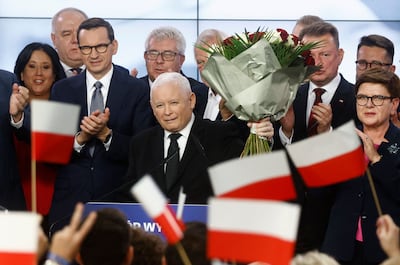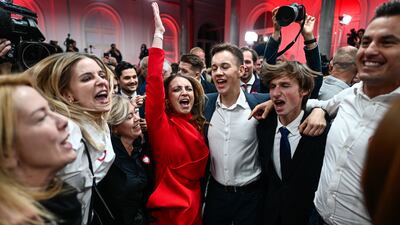Europe’s liberal flank savoured an apparent victory in Poland's general election on Monday as the country's nationalist government looked set to lose power.
The ruling Law and Justice (PiS) party was on course to lose its majority with two-thirds of votes counted, with the centrist opposition led by former EU chief Donald Tusk appearing best placed to form a coalition.
The turnout of 73 per cent was the highest recorded since the fall of communism, surpassing the historic vote in 1989 that ushered in Poland's democratic era.
The anti-immigrant PiS has been accused of eroding Polish democracy and tilting towards authoritarianism under party leader Jaroslaw Kaczynski and Prime Minister Mateusz Morawiecki.
After a string of populist successes in recent months in Europe, the result was cheered by pro-EU politicians who expressed hope of improved ties between Warsaw and Brussels.
“The signs are pointing to change in Poland,” said liberal German Finance Minister Christian Lindner, who called it a “significant vote for the whole of Europe”.
Manfred Weber, a German pro-European conservative who chairs the largest group in the EU parliament, said the result was “very good news” and “sent a message of hope”.
“The Polish people came out massively to open a new era for the country,” he said. “Nobody gets in the way of Poland and its European future.”
Benjamin Haddad, a French MP and spokesman for President Emmanuel Macron’s centrist party in parliament, welcomed what he called “excellent news for Europe”.
“We need a strong Poland to be a voice of support for Ukraine, to show leadership among the countries of central Europe and to defend democracy and the rule of law,” Mr Haddad said.
A German government spokesman said there was no sign of irregularities in voting, although complaints persisted that PiS had tried to tip the scales in its favour.
An observation mission conducted by the Organisation for Security and Co-operation in Europe said there were problems of bias on state-funded public television, which it said “demonstrated open hostility towards the opposition”.
The election took place alongside four referendums, including one on migration from the Middle East and Africa, which appeared designed to galvanise government supporters.
However, opposition calls to boycott the referendums appeared to have gained traction as results showed their turnout was well below that of the general election.

PiS was set to remain the largest party, but with no clear path to a majority, as smaller parties were seen as more likely to side with Mr Tusk’s Civic Platform.
A jubilant Mr Tusk, who called the result “the end of grim times”, previously served as prime minister from 2007 to 2014. He has pledged to rebuild relations with the EU that had soured over funding and the rule of law.
The PiS government has also presided over growing cracks in Poland’s once-unshakeable support for Ukraine. The election was closely watched after Slovakia elected a government sceptical of arming Kyiv.
President Andrzej Duda, an ally of Law and Justice, welcomed the high turnout but would not be drawn on Monday on the next steps in forming a government.
He could invite the ruling party to have the first try, with Mr Kaczynski still expressing hope that PiS could remain in power. If it cannot win a confidence vote, it would fall to parliament to propose a successor.


